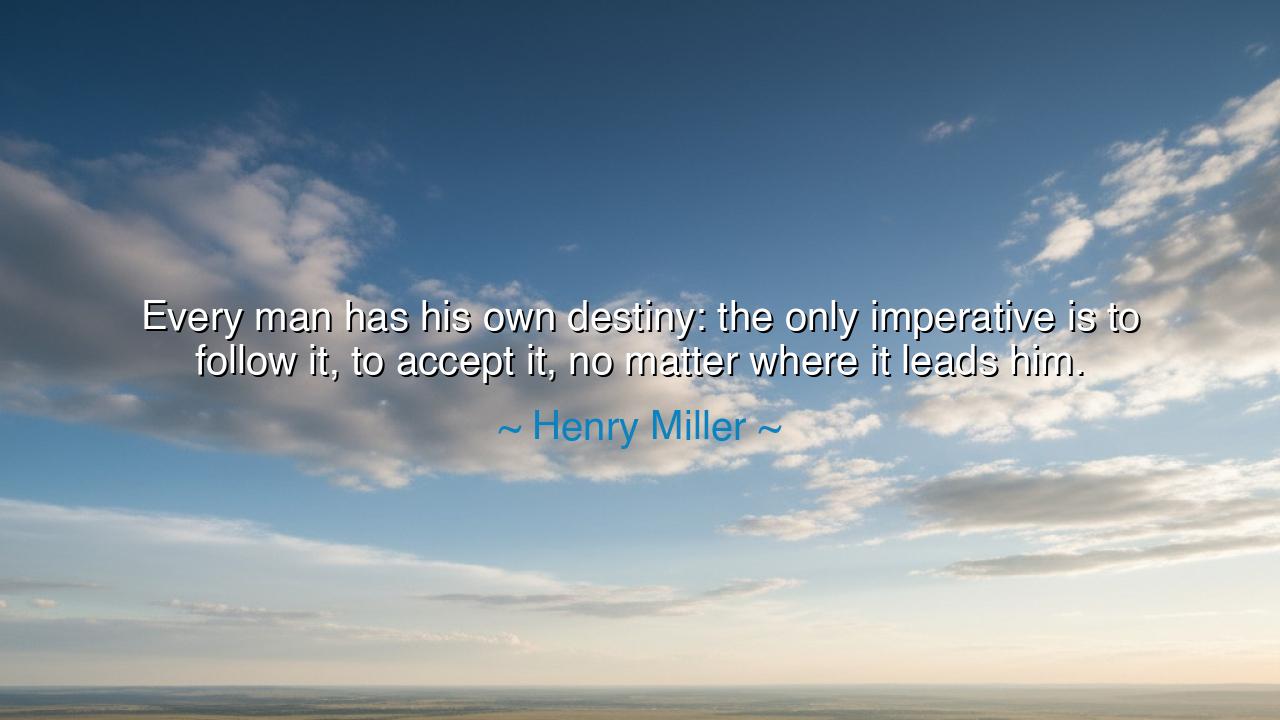
Every man has his own destiny: the only imperative is to follow
Every man has his own destiny: the only imperative is to follow it, to accept it, no matter where it leads him.






In the powerful words of Henry Miller, "Every man has his own destiny: the only imperative is to follow it, to accept it, no matter where it leads him." These words speak of the inevitability of one’s path in life—of the deep truth that each of us is bound to a destiny that is uniquely our own. Destiny, in this context, is not a force imposed upon us, nor is it something that can be resisted. It is the unfolding of our individual journey, one shaped by our experiences, our choices, and the fates that await us. To follow it is not merely an option; it is the imperative of our existence, the very reason we are born and live, and to accept it, no matter where it leads, is the ultimate expression of courage and self-realization.
The ancient Greek philosophers, particularly Heraclitus, understood that everything in life flows according to its own natural course. "You cannot step into the same river twice," he wrote, acknowledging that change is the only constant in life, and our journey is defined by the choices we make as we move forward. Heraclitus believed that each person must embrace their own nature and destiny, for only in doing so can one achieve wisdom and peace. Just as a river flows to the sea without resistance, so too must we embrace the currents of our own life, understanding that no matter how tumultuous the waters may be, they are leading us toward a purpose that only we can fulfill.
Consider the story of Socrates, who was sentenced to death for challenging the norms of Athenian society. Socrates did not beg for mercy or attempt to flee from his fate. Instead, he accepted his destiny with courage, recognizing that his life was not his own to control, but that his duty was to speak the truth and challenge others to seek virtue and self-knowledge. When the people of Athens sought to punish him for his teachings, Socrates chose to follow his path, even though it led him to death. His acceptance of his fate, his unwavering commitment to his purpose, serves as a model for us all. He teaches us that to follow one’s own destiny, no matter how painful or uncertain the journey may seem, is the greatest expression of true wisdom and integrity.
In the great historical journey of Joan of Arc, we see the embodiment of this principle in action. A humble peasant girl, Joan felt a divine calling to lead France in battle, despite having no military experience and no societal position. She followed her destiny with fearless conviction, even when the path was fraught with danger and uncertainty. Joan’s acceptance of her destiny led her to become a symbol of courage and sacrifice, and though she was ultimately captured and executed, her unwavering commitment to her path changed the course of history. Joan’s life shows us that embracing our purpose, even when it leads us to unexpected or difficult places, can have profound and lasting effects on the world around us.
Mahatma Gandhi also exemplifies this notion of destiny. Born into a system of oppression, Gandhi could have easily accepted the limited role that society sought to impose upon him. Instead, he chose to follow a path of nonviolence, truth, and justice, even when it led him into conflict with the British Empire and personal hardship. Gandhi’s acceptance of his destiny was not without struggle or sacrifice, but his unwavering commitment to his cause sparked a revolution and led to the independence of India. His life teaches us that when we follow our destiny with conviction, we do not only transform ourselves, but we also have the power to shape the course of history.
Miller’s quote carries within it a lesson of profound freedom: to accept and follow one’s own destiny is the ultimate form of self-liberation. Many of us are bound by the expectations of others, by the pressures of society, or by our own fears of the unknown. But true freedom is found in acceptance—in recognizing that the path we are walking is the one that is meant for us, and that in embracing it, we fulfill our purpose. Just as Marcus Aurelius, the Stoic philosopher-emperor, advised in his Meditations, "Accept whatever comes to you woven in the pattern of your destiny." Marcus understood that the road ahead may be difficult, but it is only through acceptance that we can find peace and clarity in the face of life’s inevitable trials.
The lesson, then, is clear: we must each follow our own path, with courage and acceptance, no matter where it leads. The challenges we face, the detours we take, the obstacles that seem insurmountable—these are the very things that shape us, refine us, and lead us to the discovery of our true selves. To reject this path is to reject life itself, for it is only by following our destiny that we come to understand who we are and what we are meant to contribute to the world. Therefore, we must embrace our journey, trust in our inner calling, and walk forward with faith, for only by doing so can we fulfill our purpose and live a life of true meaning.






AAdministratorAdministrator
Welcome, honored guests. Please leave a comment, we will respond soon